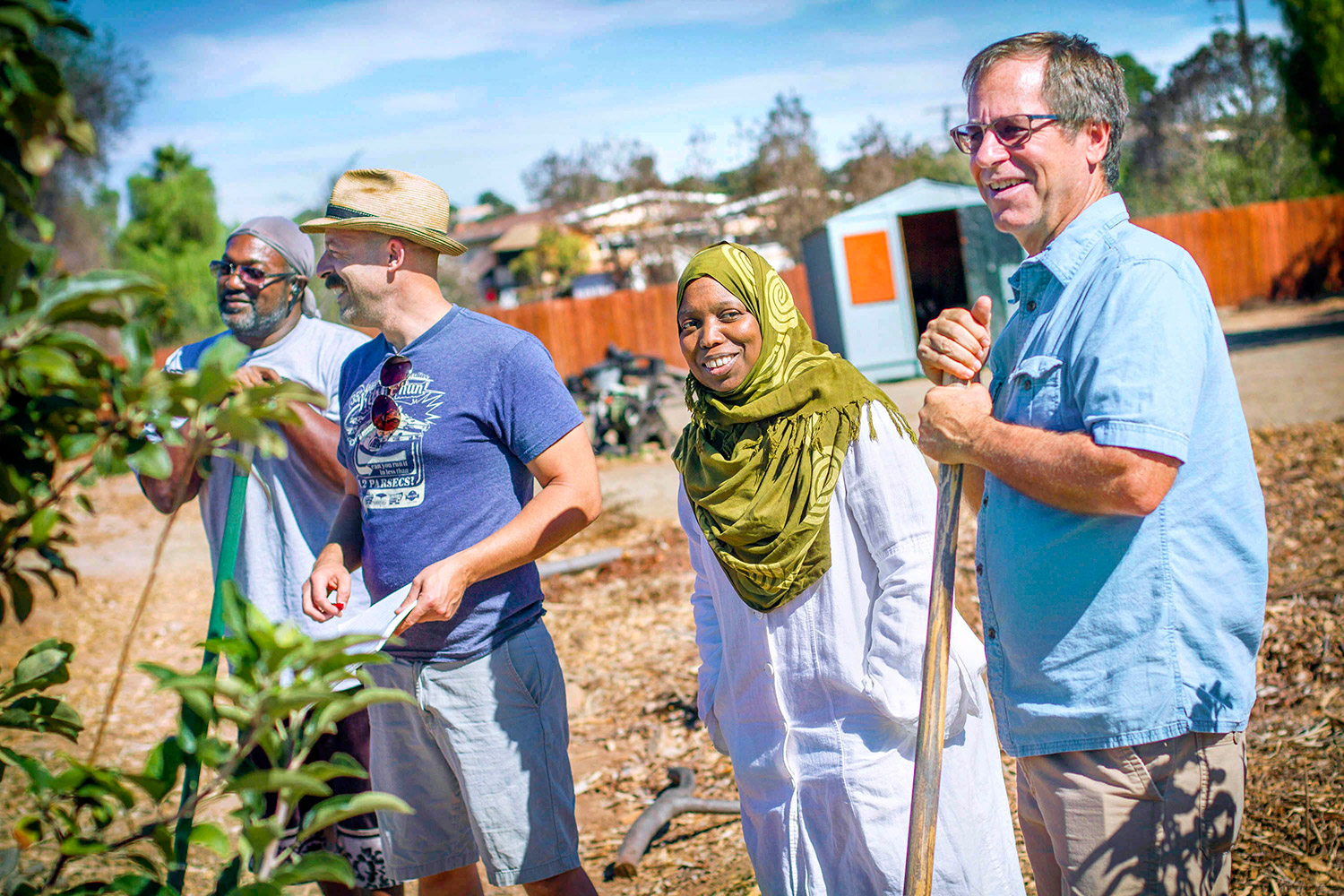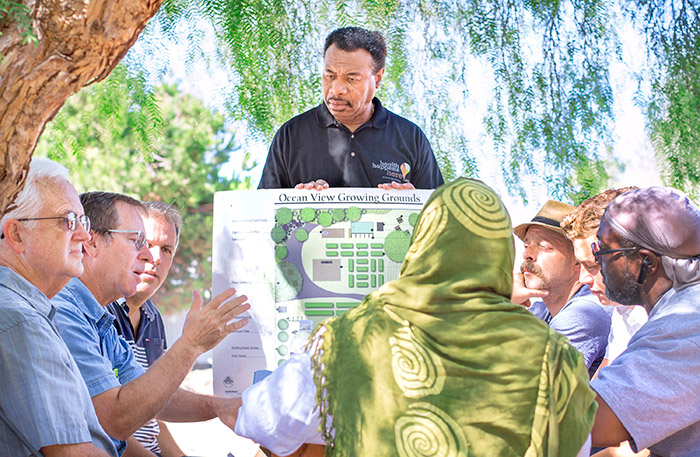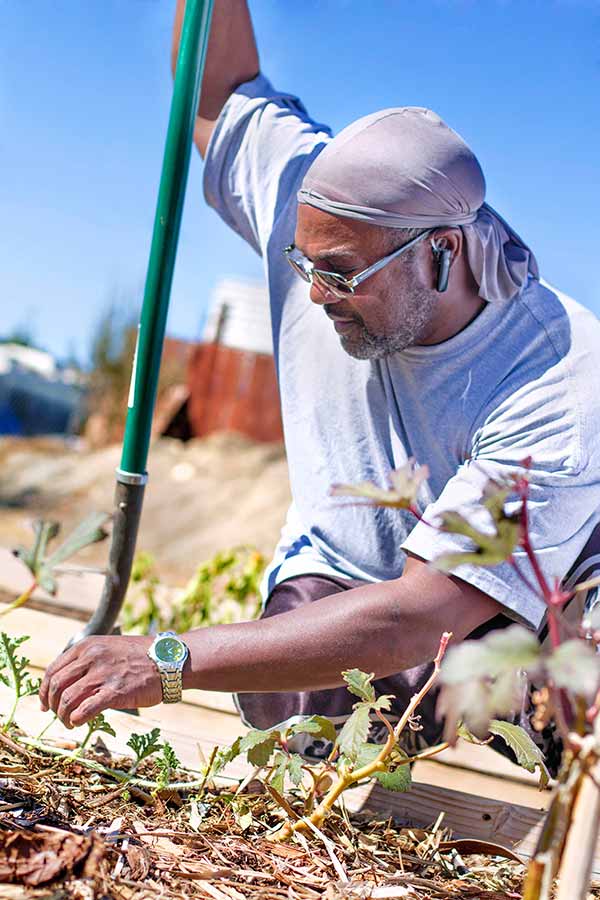
By:
- Judy Piercey
Published Date
By:
- Judy Piercey
Share This:

The Ocean View Growing Grounds in Southeastern San Diego offers a place for community members to grow nutritious food, make connections and hold neighborhood events. Pictured left to right are community leaders Deron White, James Gielow and Karemah Alhark, along with Keith Pezzoli, director of Urban Studies and Planning at UC San Diego. Photos by Erika Johnson, University Communications
A Former Food Desert Now Feeds a Community’s Spirit
In Southeastern San Diego, local residents are transforming a 20,000-square-foot vacant urban lot into a community focal point for healthy place making. Formerly a food desert—a city area that lacks supermarkets or farmers markets—the Ocean View Growing Grounds offers a gathering place for people to grow food, socialize with their neighbors and hold events.
The Ocean View Growing Grounds (OVGG) is located in the Chollas Creek Watershed where poverty, obesity and environmental degradation pose serious social and environmental public health problems. Compounding these problems is the fact that the majority of residents living in the area lack access to fresh fruits and vegetables. Neighbors active at the growing grounds are partnering with nonprofit organizations, UC San Diego researchers and students to address these problems in solutions-oriented ways.
Keith Pezzoli, director of the Urban Studies and Planning Program at UC San Diego and a faculty member in the Department of Communication, is an active participant at the OVGG. Pezzoli is working with a team of civically engaged scientists on an Urban Agriculture and Food Disparities research project. This project includes supporting the cultivation of community gardens and food forests on vacant lots, beginning with the OVGG site. Food forests mimic woodland ecosystems. Edible fruit and nut trees make up the food forest canopy, under which are comingled in layers various shrubs, plants and groundcover all of which produces food for human consumption.
Leadership at the Ocean View Growing Grounds aim to make their site a model for positive social and ecological change in underserved areas. Pezzoli and his research team, which includes undergraduate and graduate students, are helping make this happen by bringing science and technology to the people—especially plant and soil testing technologies, mapping, visualization, site assessment and scenario planning tools.
“But this isn’t just about UC San Diego,” Pezzoli emphasizes. “It is about the larger partnership taking place to build a network that will diminish food disparities by helping to make affordable and healthy food easily available. It’s about linking with organizations such as Project New Village, Groundwork, Roots San Diego and Victory Gardens that have been champions of this kind of work for a long time.”
Pezzoli, along with Dr. Wael Al-Delaimy, UC San Diego division chief of Global Health at the Department of Family and Preventative Medicine, are working with the university’s Superfund Research Center (funded by the National Institute of Environmental Health Sciences), the City of San Diego and the Environmental Protection Agency to encourage clean up and reinvestment in brownfields in Southeastern San Diego—some of which are being developed for use as community gardens. Brownfields are parcels of land previously used for industrial purposes or some commercial uses. The safe use of brownfields for urban agriculture can protect the environment, reduce blight and help lower income families gain access to fresh fruits and vegetables.
Karemah Alhark, the president of the Ocean View Growing Grounds neighborhood leadership group, said, “This is a place where we can begin to empower ourselves and the community to be self-sufficient so that we don’t have to eat things that are sub-par, that are not good for us.” She added, “My children have gotten a chance to see that by your own hand and God’s will you can grow food.”

Paul L. Watson Jr., president and CEO of The Global Action Research Center and guest lecturer in UC San Diego’s Urban Studies and Planning Program, facilitates a strategic planning session at the Ocean View Growing Grounds with community leaders and university researchers.
Another key player in this project is the Global Action Research Center (Global ARC), a nonprofit organization directed by Paul L. Watson, Jr. that is facilitating the vacant lot’s transformation by mobilizing local residents, nonprofit organizations, business leaders, scientists and university researchers. The Global ARC’s contribution—as a liaison, bridging university researchers, communities and landowners—is shedding light on opportunities and constraints regarding using private property as community commons for urban agriculture.
Watson said, “It is the hope of the Global ARC that by facilitating this collaborative partnership between the university (with its science and technology) and community residents (both young and old) with a focus on the land and the production of food, we will create a model that can be replicated in other communities throughout the state and across the nation.”

Deron White, a community leader with the nonprofit organization Peace and Unity, cultivates plants in one of the raised beds in the Ocean View Growing Grounds neighborhood garden.
Landowner Harold Georgiou, a UC San Diego alumnus and member of the Urban Studies and Planning steering committee, leased part of his lot to Global ARC for the OVGG. He is pleased, noting “it went from urban blight to a great resource, almost overnight. The land is now a jewel. It’s motivating to see the growing of food, along with land and community development, engaging the local neighborhood.”
There are now two food forests at the OVGG site. The first is in front facing the street, where 15 trees are producing fruit. There are several raised beds and wood chippings on the ground. On the west side is a set of three composting bins where people can turn food scraps into fertile soil. There is a large pepper tree in the northeast corner with a picnic table where community members can meet. The second, newer food forest is on the northwest corner, featuring 14 smaller fruit and nut trees, plus plants, and logs placed for people to sit. This food forest is planted on a berm surrounding a bioswale, a shallow depression the gardeners created in the earth to capture storm water runoff. The bioswale is form of green infrastructure designed to cleanse stormwater by filtering out contaminants through natural means (bioremediation).
According to Al-Delaimy, community gardens are a new and welcome trend in our society to provide fresh food and encourage physical activity that addresses the global obesity epidemic. “Our project with the community is good for food security and food justice,” he said. “The gardens bring a health aspect into urban development, which is why Dr. Pezzoli and I have this unique cross disciplinary collaboration. This is about giving community members new means to deal with obesity and eat healthier. The civically engaged research happening in the OVGG is an academic-community partnership to stimulate innovation in science and technology that can be applied in other communities in California and around the globe.”
The Urban Agriculture and Food Disparities research project is part of the University of California Global Food Initiative (hashtag #globalfood). The research agenda is to critically analyze and evaluate urban agriculture, including community gardens, urban farms, food forests, aquaculture and animal husbandry in low income and underserved neighborhoods. The plan is to establish a comparative multi-campus research program within the UC system dedicated to critically examining urban agriculture’s potential to increase food security and food justice.
“We’re helping democratize science and technology by involving people in civically engaged research for public benefit,” said Pezzoli. “UCLA, UC Davis and UC Berkeley, among others, are making significant advances along similar lines. UC is ideally positioned to make progress in the areas of sustainable food, water and energy systems here in California, across the border with Mexico, and throughout the globe.” He added that this work will be the subject of a new Food Justice course at UC San Diego to be offered by the Department of Communication in spring 2015.
The University of California Global Food Initiative aims to put the world on a path to sustainably and nutritiously feed itself. By building on existing efforts and creating new collaborations among UC’s 10 campuses, affiliated national laboratories and the Division of Agriculture and Natural Resources, the initiative will develop and export solutions for food security, health and sustainability throughout California, the United States and the world.
Share This:
You May Also Like
Stay in the Know
Keep up with all the latest from UC San Diego. Subscribe to the newsletter today.


